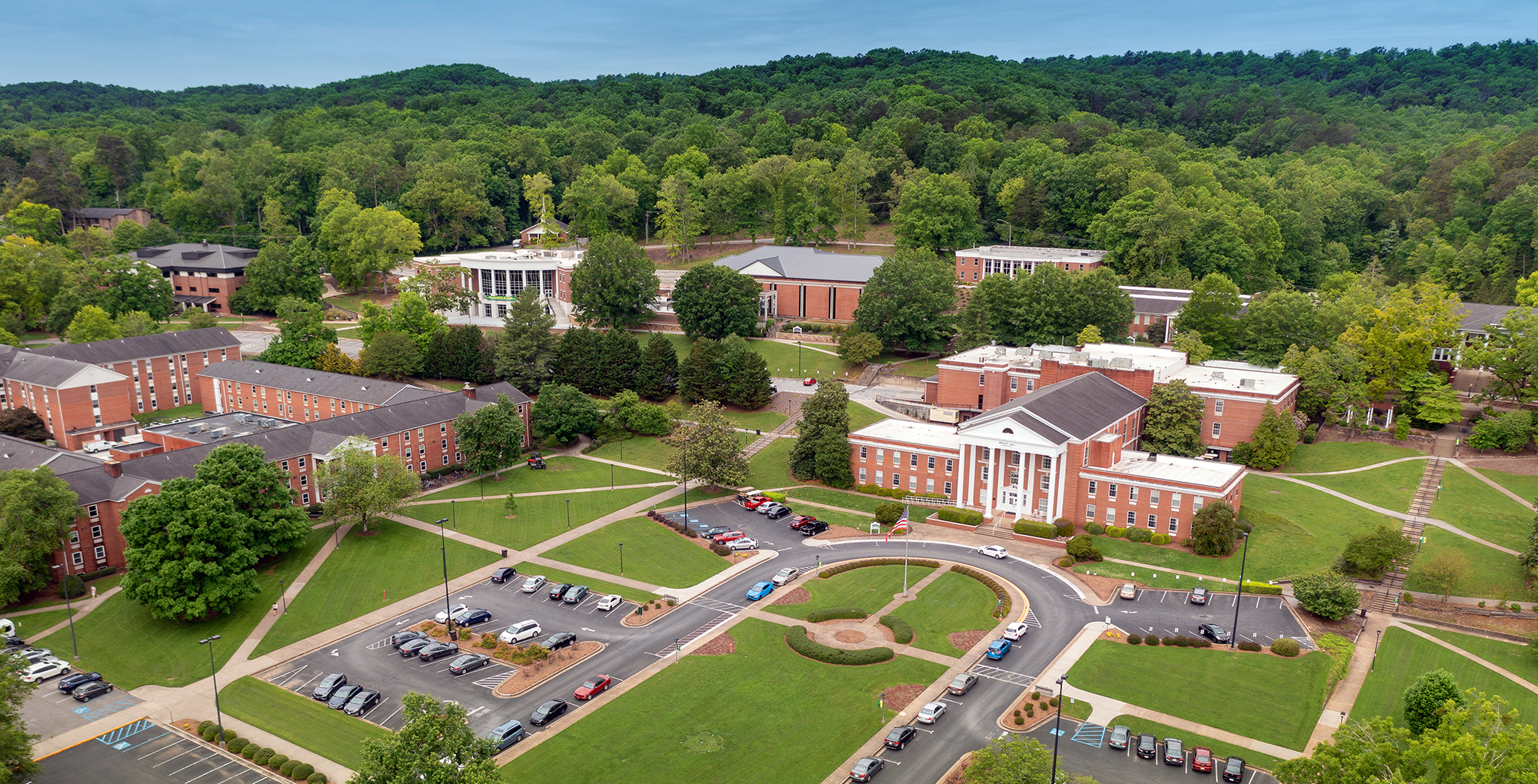
Quicknotes | july 2017
President Smith Invites Nominations for Servant Leader Awards
Servant Leaders see the potential in others, invest in their futures, and encourage their successes. As Southern celebrates 125 years in the greater Chattanooga area, we want to stop and honor local men and women who impact the fabric of our daily life, particularly those who do this by putting others before themselves.
President David Smith invites you to nominate Servant Leaders you know in our community. Three individuals will be honored at this year's gala on October 5 at 5:30 p.m. in the Iles P.E. Center. You can nominate someone in each of the three categories:
Youth (age 16-24)
Professional (active member of the workforce)
Community (e.g., retiree, stay-at-home parent)
Nominations are accepted through July 31 at southern.edu/gala.
Grant Helps Radio Station Study
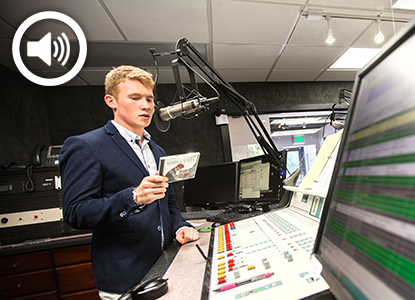
First Tennessee Foundation recently awarded WSMC Classical 90.5 a grant that allows Southern’s radio station to host focus-group luncheons for those who teach arts in the Chattanooga area. Through these meetings, the staff of WSMC and local educators hope to better understand and further define best practices for reaching underserved students with the arts.
“This grant from First Tennessee Foundation has the potential to change the lives of young people,” said WSMC General Manager Scott Kornblum, who earned an MBA from Southern in 2015. “What we learn and share with fellow educators will help light a fire within students and nurture their desire to grow in numerous ways.”
This sharpened focus on outreach is no accident. WSMC recently hired Tyler Rand, ’16, to fill a new position: social innovation manager. Since that time, the radio station has become increasingly intentional about reaching into the community. Kornblum is excited about the newfound synergy with local nonprofits and schools. He credits much of the momentum to his newest employee.
“Tyler is not only what WSMC needs right now, but what classical music needs right now—someone who loves it and has a passion to share it, especially with young people, in ways exciting ways,” Kornblum said.
In addition to the focus group luncheons, WSMC plans to continue affecting positive arts-related change in the community through a number of other efforts, including commissioning an original composition for inmates in Walker County Faith and Character Based Prison in northern Georgia (see article in future issue of QuickNotes). The station also dedicates regular airtime to local music groups, making sure their classical music performances are heard by others.
(Listen to an audio interview with Tyler Rand regarding WSMC’s outreach.)
-by Gavin Finch, senior English major
Programs Connect K-12 Students with Elderly
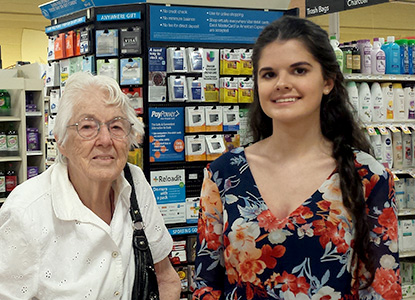
Thanks to Southern’s ASSIST program, three Mount Pisgah Academy students formed a deep friendship with Mickey Schutte, an elderly community member. They brought joy to her life, while she added purpose to theirs.
The ASSIST program’s core tenets are to teach service, provide mentorship, and help students cover the cost of Adventist education. The program offers tuition assistance for academy students who work to improve the quality of life for older adults. Along with the financial aid, students also benefit from invaluable mentoring by the senior citizens with whom they are partnered. These life lessons are priceless and the friendships enduring.
Schutte participated in the ASSIST program for two years, receiving help around the house from Mount Pisgah Academy students Elle, Austin, and Reece. The students did chores inside and outside her house, but their time together yielded far more than completed chores; it bridged a generation gap and helped provide a real sense of purpose for both the students and Schutte.
Schutte’s daughter moved to the area while her mother was participating in the ASSIST program. While it was a blessing to have a relative so close, it didn’t stop Schutte from prioritizing time with her students above everything else.
“The only thing on her schedule that she wouldn’t cancel was meeting with the students,” said Mary Kerr, ASSIST program coordinator for Mount Pisgah Academy. “She was very protective of her time with them.”
While celebrating her 92nd birthday with the students, Schutte told them, “You will never know how much you have meant to me. You have made such a big difference in my life.”
An hour later, Schutte was taken to the hospital in an ambulance. She died that same week.
Elle, Austin, and Reece will never forget her, or their time in the ASSIST program. It played a large role in their education and graduation from Mount Pisgah Academy. Through the program, these three students were not only able to help finance their education, but they also made deep connections and friendships.
Southern facilitates a similar program called Partnering for Eternity (PFE) for elementary and middle school students. In total, more than $1.2 million was awarded last year to approximately 1,500 students across the country for work with the elderly. There is room for more. If your school is interested in joining the ASSIST program or PFE, visit www.southern.edu/assist.
To invest in the continued success of the ASSIST and PFE programs, visit southern.edu/give and select “ASSIST Program” from the pulldown menu.
For an ASSIST program success story from the Atlanta area, read this article from May’s Southern Tidings.
-by Gavin Finch, senior English major
Cafferky Honored with Service Medallion

School of Business Professor Michael Cafferky, DBA, never intended to become a widely acknowledged scholar; he just wanted answers to a few important questions. The personal and professional research that followed has made him an invaluable asset to both the business and Christian communities.
In recognition of his commitment to serving others, Southern presented Cafferky with the Distinguished Service Medallion on May 7 during Commencement. He has taught at Southern since 2003 and worked in management for 20 years before that, holding positions such as marketing director, chief operating officer, chief financial officer, and interim chief executive officer at various companies. Cafferky is also the author of numerous books and articles, including two management textbooks, Management: A Faith Based Perspective and Business Ethics in Biblical Perspective: A Comprehensive Introduction.
“Receiving the university’s Distinguished Service Medallion was an unexpected high honor,” Cafferky said. “On a day-to-day basis, I get so wrapped up in my work that I am more concerned about accomplishing the next assignment, grading papers on time, and finishing the next article for publication; there isn’t time to think about how others might view my entire contribution.”
Cafferky’s has a deep trust in Scripture’s guidance for every area of life, including market relations. This commitment to Scripture led him to establish principles of service as primary in his work. In his numerous books and scholarly articles, the theme is recurrent.
“Over the years, my contribution just emerged as I pursued answers to a few really big questions about Scripture and business,” Cafferky said. “My passion to explore the issues gradually became major publications—the contributions for which I am most often recognized both here at the university and among Christian business scholars across the nation.”
For a sample of how Cafferky’s writing merges academic, business, and spiritual interests, read “Keeping Sabbath During the Week” from Southern’s Fall 2015 issue of Columns magazine.
-by Gavin Finch, senior English major
Sleeping in the Car for My Dream Job
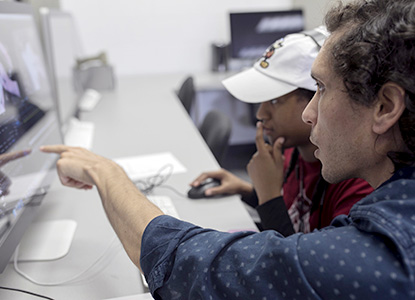
-by Nick Livanos, ’07, School of Visual Art and Design assistant professor
The movie Old Fashioned was filmed in Ohio during the fall of 2011, with Southern’s film program coordinator, David George, MFA, ’98, guiding the cameras. While he was off living the dream of being cinematographer for a theatrical feature film, someone had to cover his classes at Southern. That’s where I came in.
It gave me the opportunity to test a dream job of my own by teaching the majority of David’s classes. And I loved it. Everything in my life seemed to be getting better and better. I had recently started dating a girl (who would eventually become my wife), and I had a great full-time job with amazing co-workers at a production company in downtown Chattanooga, Tennessee.
Just when I thought my life couldn’t get any better, I was forced to choose. It was right around Thanksgiving when I learned that Southern was opening a position for a full-time professor of film production. David was finally going to get a colleague in his discipline, and he suggested I apply. I spoke to the dean of the School of Visual Art and Design about the job.
“What do I have to do?” I remember asking. I recall his answer just as clearly, “You need a master’s degree.”
A master’s? I didn’t have one. And I had just started this great production company job. Plus, there were no graduate film programs in Chattanooga, which meant I would have to move away from my girlfriend. But this felt like a calling. It felt like providence, the way doors had opened up. After all, no one would even know that I could do the job if I hadn’t substitute taught for David. So I applied to graduate school at the Savannah College of Art and Design.
I applied months past the application deadline. Their academic schedule takes a break before Thanksgiving until well after New Year’s Day, so no one should have been around to even receive my application. Plus, I didn’t know how I would afford it, if I somehow got in. I told my production company boss, “Look, it’s a long shot and the cards are stacked against me, but if I get accepted, I’m going to go.”
A few weeks later, I still hadn’t heard anything. Graduate courses started on Monday, and I think it was a Thursday when I got a phone call from the chair of the Film and Television department in Savannah. He wanted me to come. And he offered me a $10,000 scholarship to help me make it happen. So that was it.
I quit my job. I told my girlfriend. I moved to Savannah with everything I owned in my car. For the first two nights, I rearranged all those belongings so I could sleep in my car while I searched for an apartment. Over the course of eight short months, January through August, I completed a master’s degree in film and television production. Somewhere in there, I interviewed for the faculty position at Southern and—spoiler alert—landed the job. My last graduate session was on a Wednesday night. The first course I had to lead at Southern was the following morning.
I skipped my last class as a student so I could drive a U-Haul back to Collegedale and teach my first class as a professor. My years at Southern have been the best of my entire life. I married, became a father, and watched my first students graduate.
God has guided my story, and I believe He continues to do so. Which means that all of this goodness is just the beginning!
Called to Southern” is a series for QuickNotes that highlights the path our faculty and staff have taken to end up on campus. There is a definite pattern that shows God’s leading, and we look forward to sharing these stories with you.
Tour Takes Group in Luther’s Footsteps
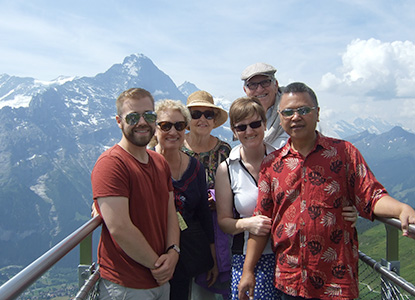
Southern’s third Alumni Association tour took place June 13-25. Twenty-six alumni, employees, Southern volunteers, and friends of the university enjoyed traveling through Germany and Switzerland during the 500-year celebration of the Protestant Reformation. Professor Emeritus Bill Wohlers, PhD, led the trip.
The group experienced cable car rides, mountain hikes, a cathedral organ concert, a boat ride, historic city tours, and bus tours during the trip. Some of the more specific activities included visiting Martin Luther’s birthplace, as well as Worms Cathedral (where Luther presented his theses to authorities) and several Geneva and Zurich reformation sites.
But the trip wasn’t exclusively historical in nature. Alumni Relations Director Evonne (Kutzner) Crook, ’79, said that her favorite part was seeing the mountains in Switzerland, practicing her German, and trying different types of foods.
Southern’s group included a large mix of ages and travel histories. Some of the participants—ranging in age from 25 to 81—were international travel veterans; others had never left the United States. Despite their age range, participants used the time to build relationships and connections. After returning to Tennessee and unloading from the bus in Southern’s parking lot, the group stayed together talking. This surprised Crook, as they had just gotten off a nearly two-week trip and 10-hour flight. She expected them to be anxious for the comforts of home. Instead, Crook overheard participants inviting their new friends to visit one another and exchanging contact information.
Biology Department Professor Rick Norskov, MD, ’76, took full advantage of these connection opportunities.
“Because of our tour, I made new friends and strengthened older friendships,” Norskov said. “Besides having similar religious backgrounds, we each knew people in common within the great Adventist Family.”
The Reformation Tour was loaded with specific historical value, but Crook recognizes aspects of Southern’s broader mission in all group trips.
“Along with developing new friendships, time spent together in travel encourages lifelong learning and greater appreciation for world history and different cultures,” Crook said.
-by Gavin Finch, senior English major
Upcoming Events
WELLkids Day Camps
Southern at ASI Convention
Documentary Film Series
Alumni Golf Tournament
Homecoming Weekend
